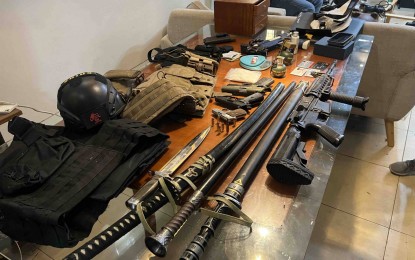
SEIZED. Authorities seize several high-powered firearms from a Chinese national in Barangay Bambang, Taguig City last April 14. Some Chinese nationals, who were arrested over possession of high-powered firearms and bribery attempts, were later linked to Philippine Offshore Gaming Operators. (Photo courtesy of NCRPO)
MANILA – The Chinese Embassy in Manila on Thursday said it supports the Philippines’ efforts in addressing issues related to offshore gaming operations.
The statement was made following the arrest of some Chinese nationals over possession of high-powered firearms and bribery attempt, who were later linked to Philippine Offshore Gaming Operators (POGO).
“The Chinese Embassy stays in communication with the Philippine law enforcement agencies on offenses related to POGO, and supports the Philippine side in addressing the root causes of the problem arising from the offshore gambling industry,” it read.
The embassy said gambling in any form is illegal in China and it does not condone Chinese nationals engaging in such businesses abroad.
It also reiterated that the Chinese government consistently reminds its nationals overseas to abide by local laws and regulations.
READ: Chinese nationals nabbed for high-powered arms, bribery attempt
“Gambling is a social menace. Chinese people are victims of offshore gambling,” the embassy said.
Police seized high-powered firearms, ammunition, and other contraband from a Chinese national identified as Haiqiang Su in Barangay Bambang, Taguig City last April 14.
Two other Chinese nationals who were present at the house were placed under custody for further verification.
Another Chinese individual was also apprehended for attempted bribery for the release of those earlier arrested.
No let-up
On Thursday, the Bureau of Immigration (BI) said 76 Chinese nationals were among the 401 foreigners it has barred from entering the country due to various immigration violations from March to early April.
Vietnamese nationals topped the list at 254, BI Commissioner Norman Tansingco said in a statement.
Also excluded from the country are 19 Indonesians, 17 Burmese nationals, eight Moroccans, and four Ghanaians after they were found to be improperly documented or have doubtful purpose of staying in the country.
Tansingco said the rise in exclusions was a result of intelligence information that the majority of the foreigners were working for illegal online gaming hubs in the country.
“We look at patterns of previous arrests, as well as travel histories of other intercepted aliens. We use this pattern to intercept other potential violators, as well as those holding spurious documents,” the BI chief added.
Excluded aliens board the next available flight back to their port of origin.
On the other hand, those denied entry for being likely to become a public charge are included in the BI’s blacklist which would prevent future entry attempts. (with Ferdinand Patinio/PNA)
